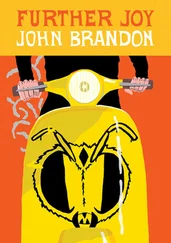Ron Darling had a bunch of other foster kids, all boys, and he hired them out for work. It was like he had a labor agency but didn’t have to pay the workers. Or barely pay them — five bucks a day. He could undercut the legitimate agencies and he got paid under the table. He would drive Arn and his brothers to some lumberyard or machine shop and put his feet up and read a crime novel, occasionally looking up to dole out praise. He told the boys that in order to overcome being foster punks, they had to learn how to work hard, that work could save them. And Arn always worked hard.
One of his foster brothers under Ron Darling, a black kid with jutting bottom teeth, constantly annoyed Arn. Arn didn’t mind work, but he minded this kid and his grainy, rising voice. The kid would not stop talking. He tried to give Arn tips while they worked, tried to show him shortcuts and reveal the finer points of power tool use, but the kid didn’t know any more than Arn did. Every slip Arn made, the kid would be standing over him, wagging his head. He’d click his tongue and say something like, “Told you — work smart, not hard.” The kid had comments about what Arn ate, about his T-shirts. Arn did not want to bicker with this kid, yet he did. The kid had a way of drawing Arn in. All Arn wanted to do was fistfight and get it over with, but somehow it never came to this. The kid had been at it a long time, irritating people, and was skilled at narrowly avoiding violence.
One day, Ron Darling could not ignore them any longer. Arn had screamed at the kid and the guy who owned the little moldings plant had heard. It was a Sunday. Arn had declared that if the kid spoke again in the next five minutes he was going to kill him, that he was going to hit him in the head with a hammer as many times as it took to make sure the kid could never say another word, and if Arn had to go to jail or juvenile hall that was fine was him. Ron Darling walked over, pointedly not worked up, and asked the black kid to come with him. They left and Arn kept working. He had no idea which one of them was in trouble, he or the black kid. Without the kid’s yapping and Ron Darling’s oppressive presence, Arn got most of the job done that day.
In the evening, back at the house, the black kid was nowhere to be found. He wasn’t going to be there anymore. Ron Darling said they weren’t going to discuss it. He wasn’t angry with Arn, wasn’t pleased with him. A problem had arisen concerning his business and he’d smoothed it out; that was all. Arn saw the value in being a good worker, but also he felt he’d won something not worth winning.
Terrance. That was the black kid’s name.
Quickly a replacement was found for Terrance, an Indian kid who claimed to have run away from a reservation. Arn suspected it was a rule; you could only have so many white kids before you had to take a minority. The new kid was surly and weighed his words. Almost instantly upon his arrival, Ron Darling began ridiculing him. His name was Jonathon and Ron Darling pronounced his name in a syrupy lilt, as if the Indian boy were gay. Ron Darling invited the other boys to join in with the ridicule, and most did. Ron Darling said it over and over, the kid’s name, and Jonathon went into a determined campaign of avoidance. He read a lot, war histories, and stared out an open window. Arn was friendly to Jonathon whenever he got the chance, when Ron Darling was elsewhere. The kid seemed above conversation but he sometimes spoke lone statements toward Arn. “My mother descended from the people of Sitting Bull, my father from bridge builders.” Statements like that. “My honor exists, fully formed. I need only find it and wear it like a fine coat.”
One evening Jonathon refused the dinner Ron Darling served and Ron Darling began calling him names. Jonathon stood and calmly announced that Ron had no grounds to speak even a single word to him, that Ron’s babble was but dried thistle in the wind. Ron Darling grew earnest and told Jonathon he ought to be grateful, that he could do a lot worse, and Jonathon replied that Ron Darling understood the nature of true gratitude as well as a hamster understands calculus. Ron Darling, now flustered, said he could see why no reservation would want a useless punk like Jonathon, and Jonathon declared that he would rather die than live on a reservation, that he would rather perish shivering in the wilderness than rest warm and fed but with his heart full of the white man’s lies. Ron Darling, no way around it, was losing a verbal confrontation with a twelve-year-old kid. He wanted to hit Jonathon — in fact, he raised a tense arm — but that was the one thing he couldn’t do. He couldn’t hit a kid and put his business in jeopardy. He could either keep the kid and keep making fun of him and risk being made a fool, or he could do what he’d done with Terrance — invent some infraction worthy of dismissal and send him down the line to the next family. Which was what he did.
Arn, in Jonathon’s absence, felt spineless. He felt like Ron Darling’s pet. He liked working hard, but he was losing faith in it. For choosing the evil he knew in order to delay the next move, the next upheaval, he felt beaten in spirit.
A few weeks before eighth grade was to start, Ron Darling’s wife left. It surprised Arn how much this event damaged Ron Darling. He grew sullen and less mean. He ate nothing and played music in the house almost constantly, music without words, music that seemed meant to drown out whatever was going on in his head. His wife had been a negligible presence, not wanting much to do with the boys, but apparently Ron Darling had needed her for something. Maybe her family had money and now Ron Darling would never get it; maybe she’d found someone who would give her kids of her own, though she was kind of old for that. In her absence, Ron Darling began talking almost exclusively of a time — some distant decade — when he’d ridden the crest of a Houston real estate boom, owned a fleet of BMW’s, had a hickory tree growing in his living room and a live-in maid. “I’ve been a maid and I’ve had a maid,” he kept saying, almost singing it, like a country song. Arn wondered if Ron Darling had ever even lived in Texas. He never mentioned his wife. He was less mean, but it seemed like he was saving it up, hoarding his ill will for a specific purpose. It even occurred to Arn to comfort him, but he didn’t know how. There were a couple other boys who’d been with Ron Darling longer. They were giving him a wide berth, so Arn did the same.
He went to school and people talked to him and he took notes and sneaked a cigarette now and then. He came home and ate snacks and watched TV and chuckled at the jokes of his foster brothers. No more dinners were served. Several weekends came and went with no work, no piling into the pickup and putting on gloves that were too big and toiling the minutes away and then breaking for burgers and then toiling the rest of the minutes away. It took Arn well into the fall semester to realize it: Ron Darling had lost interest in his business and had quit booking jobs. He’d lost interest in much, and one of those things was scuttling around chasing a buck. Arn had been slow on the uptake, and now all the warm weekends had passed.
At school, Arn and his foster brothers were wary of each other. They all had something in common, something to be ashamed of, but that shameful fact could be worked around as long as they weren’t together. One of the brothers ran track. One was a nerd. One a suave horn player. Arn decided to try out for basketball and found that it was not a difficult game. All he had to do was hustle and good things happened. It was a school of the whitest kids around. If Arn decided to snare every rebound, he could. If he decided to score a lot, he could. The coach didn’t go out of his way to praise Arn, but Arn figured that was because the coach didn’t want to show favoritism. The tryouts lasted a week, and by the end of that week Arn knew he’d found an identity as an athlete that might obscure his other identity as a foster kid. Instead of laboring with shovels and drills, he would burn the hours of his weekends practicing free throws and learning to dribble with his left hand.
Читать дальше












